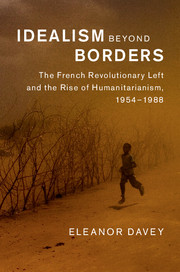Monograph reviewed for Social History, Vol. 43, No. 1 (2018), pp. 156-158. doi:10.1080/03071022.2017.1397367

Summary: Davey convincingly argues that tiers-mondisme and sans-frontiérisme were never so far apart as their advocates subsequently claimed, showing that they always shared key points of reference (the post-colonial third world, the Second World War) and even key practices (e.g. ‘speaking out’, ‘the refusal of complicity’, p. 255). Biafra was not so much a ‘dramatic mutual rupture’ as the start of a ‘diffuse’ process (pp. 47–8) of distancing in which understandings of the third world were reinterpreted through debate. The very areas of overlap between tiers-mondisme and sans-frontiérisme permitted some, such as Kouchner, ‘to adjust their horizons without fully questioning their paths’ (p. 256).